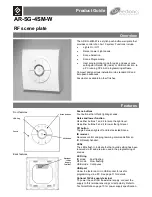
CHAPTER 3: Piano Playing Features
42
Continue to next page...
Englis
h
To mute the piano sound,
tap on
.
turns to red. Each time you tap on
, the piano sound
turns on and off alternately.
3
Tap on [SplitPoint], and then press
to select a note as the split point
(within the range from [A-1] to [C7]) if
necessary.
The selected note and notes lower than that note are
assigned to the left-hand part, and the notes higher
than that are assigned to the right-hand part.
Note:
The split point can be set only when
both
and
/
are turned on
(blue).
4
Tap on the voice name of the desired
part.
5
Tap on the desired voice.
6
Tap on [Volume]
/
to
adjust the volume of the selected
voice.
7
Tap on
to complete the
operation.
In Quiet or Headphone mode, when a voice contained in
[AEM Brass], [AEM Sax], or [AEM Section] Instrument
Group is selected, depressing the pedal adds articulations
specific to the wood/brass wind. Three types of
articulation are assigned to the respective pedals.
Soft pedal:
Assigned for adding Head (blow-up) articulation to
the manner of beginning a note.
Sostenuto pedal:
Assigned for adding Joint articulation to the interval
of two notes.
Damper pedal:
Assigned for adding Tail (fall-down) articulation to
the manner of ending a note.
Adding Expressive Effect to
Your Play
1
Select the desired voice contained in
[AEM Brass], [AEM Sax], or [AEM
Section] Instrument Group. (
→
pg. 74
“Piano Voice List” and pg. 19
“Selecting the Voice in Quiet/
Headphone Mode” in “Quick Guide”)
2
Operate the key and the desired
pedal.
The key and pedal operation varies depending on
the type of the articulation.
For Head (blow-up) articulation
1
Press and hold the soft pedal, and then press the
desired key.
The blow-up speed is controlled in accordance
with the angle of the pedal that is pressed.
Soft pedal
Sostenuto
pedal
Damper pedal
AdvancedManual.book Page 42 Friday, May 23, 2008 11:45 AM
Summary of Contents for disklavier Mark IV Series
Page 1: ......
Page 10: ...English ...
















































